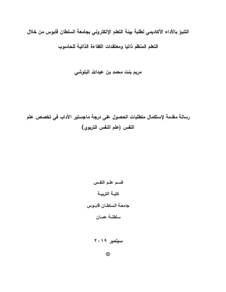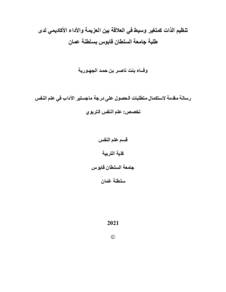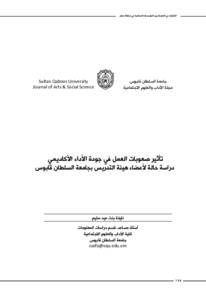Document
التنبؤ بالأداء الأكاديمي لطلبة بيئة التعلم الإلكتروني بجامعة السلطان قابوس من خلال التعلم المنظم ذاتيا ومعتقدات الكفاءة الذاتية للحاسوب
Publisher
جامعة السلطان قابوس
Gregorian
2019
Language
Arabic
Subject
English abstract
The present study aimed to identify the extent to which self-regulated leaming and computer self-efficacy beliefs contributed to predicting the academic performance of students in the e-leaming environment at Sultan Qaboos University in the Sultanate of Oman, as well as identifying the level of self-regulated learning and computer self-efficacy beliefs and the extent of their differences by gender. The study followed the descriptive approach. The sample of the study included 51 male and female students studying in eleaming method and enrolled in electronic courses at the university. They were deliberately selected. To collect the data, the motivated strategies for learning questionnaire and computer self-efficacy beliefs scale were applied. The results of the study indicated that students in the e-learning environment had a high level of self-regulated learning and a very high level of computer selfefficacy beliefs. There were no statistically significant differences in selfregulated learning and the computer self-efficacy beliefs due to gender. The results of linear regression analysis also showed that the self-regulated learning axes and the computer self-efficacy beliefs with each other contribute by 19% to predict academic performance among students in the e-learning environment. The study recommends promoting e-leaming at the undergraduate level as an educational environment and promoting selfregulated learning to support academic performance.
Key words: Self-Regulated Leaming, Computer Self-Efficacy Beliefs, Academic Performance, E-learning Environment.
Member of
Resource URL
Arabic abstract
هدفت الدراسة الحالية إلى التعرف على مدى إسهام كل من: التعلم المنظم ذاتيا، ومعتقدات الكفاءة الذائية للحاسوب في التنبؤ بالأداء الأكاديمي لدى طلبة بيئة التعلم الإلكتروني بجامعة السلطان قابوس بسلطنة عمان، وأيضا معرفة مستوى التعلم المنظم ذاتيا ومعتقدات الكفاءة الذاتية للحاسوب ومدی إختلافهما بإختلاف متغير الجنس، وقد أتبعت الدراسة المنهج الوصفي واشتملت عينة الدراسة على 51 طالبا وطالبة ممن يدرسون بطريقة التعلم الإلكتروني والمسجلين في المقررات الإلكترونية بالجامعة، وقد تم إختيارهم بطريقة قصدية، ولجمع بيانات الدراسة تم تطبيق مقياس الإستراتيجيات المحفزة للتعلم (MSLQ)، ومقياس معتقدات الكفاءة الذاتية للحاسوب (CSEE). أشارت نتائج الدراسة إلى امتلاك طلبة بيئة التعلم الإلكتروني مستوى مرتفع من التعلم المنظم ذاتيا ومستوى مرتفع جدا من معتقدات الكفاءة الذاتية للحاسوب، وعدم وجود فروق دالة إحصائيا في التعلم المنظم ذاتيا ومعتقدات الكفاءة الذاتية للحاسوب تعزي لمتغير الجنس، كما أظهرت نتائج تحليل الانحدار الخطي أن أبعاد التعلم المنظم ذاتيا ومعتقدات الكفاءة الذاتية للحاسوب معا يسهمان يتصية 19% في التنبؤ بالأداء الأكاديمي لدى طلبة بيئة التعلم الإلكتروني، وتوصي الدراسة بتعزيز التعلم الإلكتروني في المرحلة الجامعية كبيئة تعليمية، وتعزيز التعلم المنظم ذاتيا لدعم الأداء الأكاديمي. .
الكلمات المفتاحية: التعلم المنظم ذاتيا، معتقدات الكفاءة الذاتية للحاسوب، الأداء الأكاديمي، بيئة التعلم الإلكتروني.
الكلمات المفتاحية: التعلم المنظم ذاتيا، معتقدات الكفاءة الذاتية للحاسوب، الأداء الأكاديمي، بيئة التعلم الإلكتروني.
Category
Theses and Dissertations



